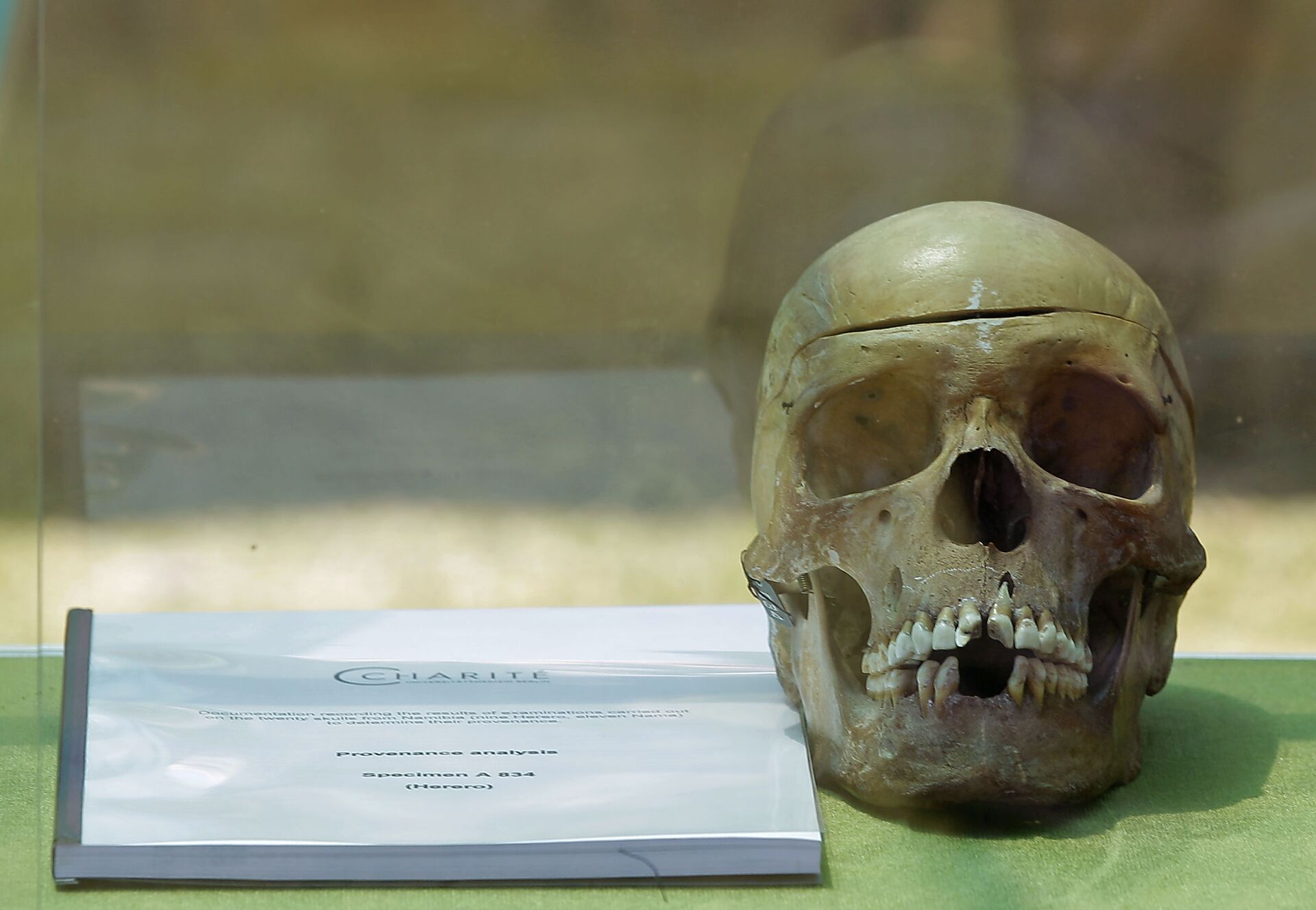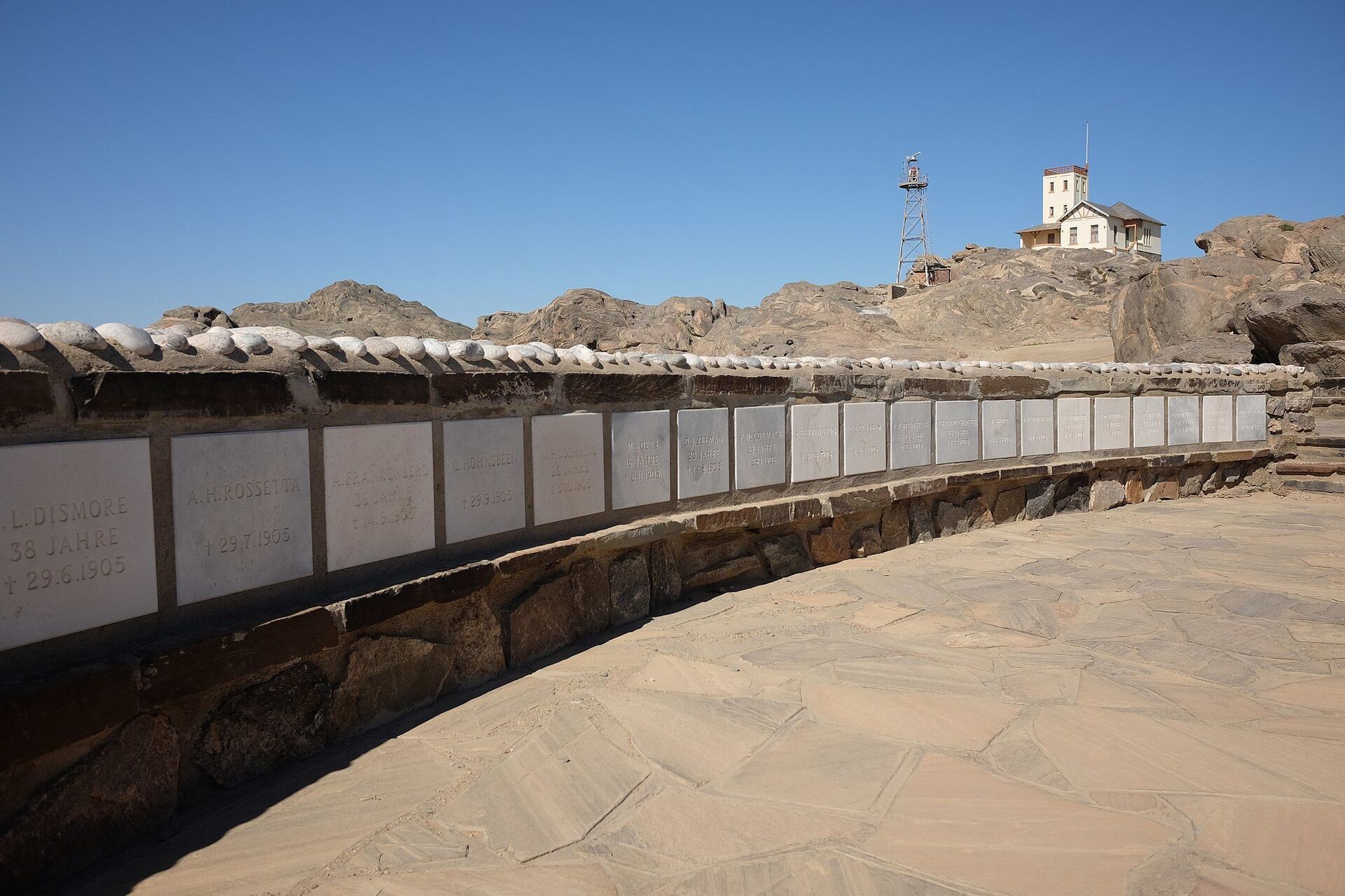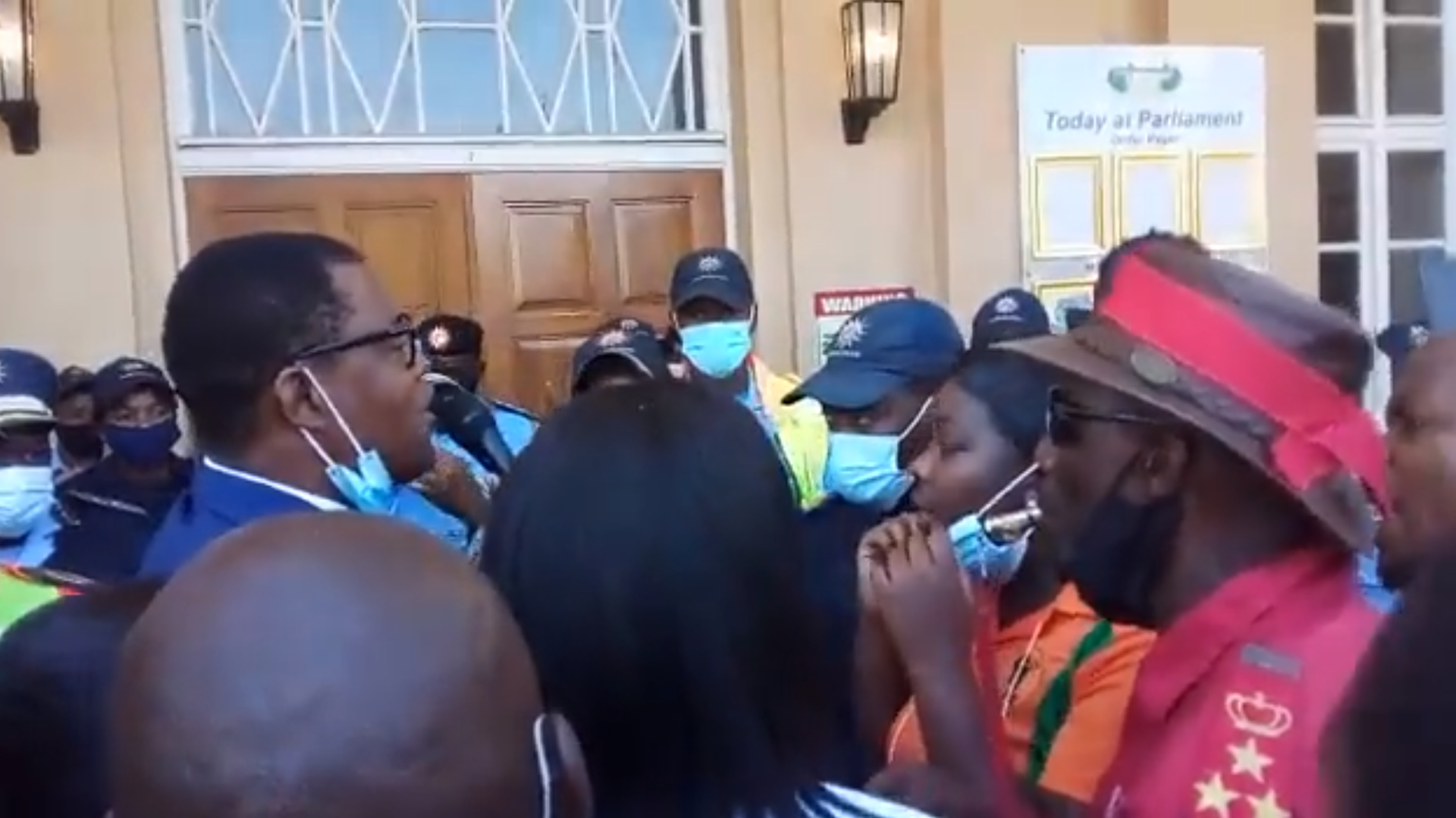Video: Protesters Storm Namibia’s Parliament as Opposition Rejects ‘Fake Genocide Deal’ With Berlin
22:54 GMT 23.09.2021 (Updated: 11:35 GMT 23.11.2022)
Subscribe
As the Namibian parliament debates acceptance of a $1.3 billion settlement with the German government after Berlin admitted to committing genocide against the country’s Herero and Nama peoples in the early 20th century, protesters outside demanded the basics of the deal be renegotiated, saying it won’t help the affected communities.
"That document does not address our issues, it does not speak about reparations and genocide. It is speaking about reconstruction," Esther Muinjangue, president of the opposition National Unity Democratic Organisation [NUDO] party, said in the Namibian parliament on Wednesday.
"We are not asking for reconstruction, you committed genocide and for that you pay reparations. Simple as that," she added. The majority of NUDO supporters are Ovaherero, one of the tribes the Germans targeted for extermination between 1904 and 1908, when Namibia was a colony called German South-West Africa.
Defence Minister Frans Kapofi defended the agreement as "an achievement, of some measure, to get the Federal Republic of Germany accepting responsibility" for the genocide.
He acknowledged that the final payment amount, which amounts to roughly $40 million per year for the next 30 years, is regarded by many as inadequate, and said that “an improvement of the terms of reparations, particularly on quantum, is not out of the question.”
Mike Kavekotora, leader of the Rally for Democracy and Progress (RDP), a small opposition party split from the ruling South West Africa People’s Organization (SWAPO), urged that the government should seek at least $9 billion from Germany instead.
The final deal will have to be approved by both German and Namibian parliaments and signed by their respective prime ministers.
‘People Don’t Eat Projects’
Outside, an estimated 400 protesters marched to the National Assembly, surrounding much of the building and coming up the terrace to the legislature’s front doors. They chanted, sang, and danced, and carried placards reading "Say no to the fake genocide deal"; "the blood of our ancestors was not in vain" and "proper reparation now,” according to Africa News.
Windhoek. Herero, Nama and friends descend on the Namibian parliament to protest against the Namibian and German Governments ‘stitch up’ agreement! #Herero #Nama #Germany #Deutschland #Namibia pic.twitter.com/asuNfAKdYc
— Eddiesurfs.👀 (@ed28990343) September 21, 2021
#Herero #Nama #Germany #Namibia #Deutschland pic.twitter.com/CK82kNNcna
— Eddiesurfs.👀 (@ed28990343) September 21, 2021
The negotiations began six years ago, but many Nama and Herero people believe the Namibian government wasn’t willing to fight for a better deal, including one that would transfer wealth to the affected communities instead of being invested into social programs, because the ruling SWAPO party is dominated by the Ovambo tribe, which was not targeted for genocide.
"The agreement that was negotiated is highly skewed and extremely favours the German government rather than the descendants of the victims of the 1904-1908 Ovaherero Nam Genocide,” Chief Manasse Zeraeua told New Era, a Namibian daily paper published by the government, earlier this month, urging it to be referred back to committee for renegotiation.
"We don't have a problem with acknowledgment and apology, we have an issue with reparations, and they are talking about grants and it is different from reparations and whatever terminology is being used, that money is simply not enough," Zeraeua added. "A 90-year-old will benefit more from social grants so that they can afford things they couldn't. People don't eat projects, people eat food. Confining that money to projects over 30 years is an insult."
"We want to be treated equally, like other victims of genocide that Germany has paid out and said sorry to," Vipuakuje Muharukua, a lawmaker from the Popular Democratic Movement who is a descendant of genocide victims, told Deutsche Welle. Many Hereros have contrasted the effort Germany has put into making restitution for the Nazi-era genocides of Jews and other lighter-skinned minorities with their treatment of Black African victims.
"A government should govern for all people,” Muharukua added. “We do not need a government that will budge to the demands of Germany, regardless of the fiscal situation. We have history on our side. We Namibians will accept nothing less than just reparations.”
Mixed Messages From Berlin
In Berlin on Wednesday, German President Frank-Walter Steinmeier urged the nation to square with its colonial past, which included pillaging of several African nations’ wealth and artwork, in addition to the mass deaths.
“Especially the countries in Africa have lost an immense part of their art through the raids of the Europeans,” the Social Democratic Party member and head of state said, according to the Associated Press.
“The injustice committed by Germany during colonial times must concern all of us, the entire society,” he added. “We will only be able to understand and overcome the deeper roots of everyday racism if we shine a light on the blind spots of our memory and if we face our colonial history much more than we have done so far.”

A skull from Germany on display in the city of Windhoek, Namibia, Tuesday, Oct 4, 2011. Hundreds of Namibians welcomed home the skulls of ancestors taken to Germany for racist experiments more than a century ago. The skulls are "testimony to the horrors of colonialism and German cruelty against our people," Prime Minister Nahas Angula said at an airport ceremony, "The Namibian nation accepts these mortal remains as a symbolic closure of a tragic chapter."
© AP Photo
However, Steinmeier’s words were spoken in front of the Humboldt Forum on the occasion of its opening. The museum, a reconstructed replica of an imperial palace torn down by the socialist government that ruled East Germany between 1945 and 1990, was built to house 20,000 pieces of African, Asian, and other non-European art.
Among them are the famous Benin Bronzes, intricate sculptures taken from the Kingdom of Benin, which is today part of Nigeria, despite the existence of the country of Benin, which was a German colony. Berlin has drawn up plans to eventually return the sculptures to Nigeria, and all 16 German states have made similar pledges for the colonial-era art in their local collections.
A study commissioned by the French government in 2018, another former major colonial power in Africa, found that more than 90% of African art is housed in museums outside the continent. However, even in Europe, much of the art pillaged by the Nazis in their continent-spanning wars in the 1930s and 1940s also has not been returned and continues to be traded.
Colonialism and Resistance
The new German Empire laid claim to the territory of Namibia in 1884 amid the Scramble for Africa, when European empires divided up the continent in their hunger for national resources, export markets, and national prestige. As German settlers seized more and more of the country’s scarce tillable land, the indigenous African tribes were increasingly forced off the land.
In 1904, several Herero and Nama tribes joined forces and launched a major revolt against the land seizures as well as plans to force them into reservations like those created in the United States for Native American tribes amid similar land seizures. In response, German commander Lothar von Trotha, who was sent to crush the uprising, ordered that “every Herero, with or without rifles, with or without cattle, will be shot,” giving a similar order for the Nama people the following year.
The German colonial forces drove the African tribes off their lands and into the harsh deserts of the interior, sealing off their wells and watering holes to stop them from returning. Those who survived the desert were put into concentration camps and used as slave labor, where many more died. In the end, 80% of the 100,000-strong Herero people and 50% of the 10,000-strong Nama people had been killed by 1908.

Shark Island, Lüderitz, Namibia. Formerly an island, it is now a peninsula. It was the home of the Shark Island Concentration Camp between 1905 and April 1907, as part of the Herero and Namaqua genocide of 1904–1908.
After World War I, the territory was passed to the victorious United Kingdom and became a colony of South Africa, being subjected to the same Apartheid white supremacist system as the rest of the country. However, SWAPO led the insurgency against South African rule and secured independence for Namibia in 1990, as South Africa’s invasion of neighboring Angola collapsed and the anti-Apartheid movement inside South Africa grew stronger. White Apartheid rule in South Africa ended just four years later, in 1994.
SWAPO has been the ruling party ever since and has overseen attempts at reforming land ownership and the legal code. However, the country’s colonial legacy persists in many ways, including in thedistribution of wealth: white descendants of German and South African settlers constitute just 6% of Namibia’s population, but hold roughly 80% of its wealth, including 72% of all agricultural land.




